Breast cancer patients seek solidarity, ‘community’ from Field of Women
Paul Hughes was told he had incurable cancer and 18 months to live shortly before welcoming his second child. He’s now fighting for more time, and better outcomes for men like him.
NSW
Don't miss out on the headlines from NSW. Followed categories will be added to My News.
On the brink of welcoming his second child into the world, Paul Hughes learned his breast cancer was incurable.
The then-43-year-old was given “a 50 per cent chance of being alive in 18 months”. He had to break this news to his partner, Shauna, the day before she started maternity leave.
About a year on from his metastatic diagnosis, Mr Hughes’ life expectancy has improved to five years after he responded well to oral chemotherapy.
“It’s still horrific, it’s awful for my kids and my partner. But … it’s less diabolical than 18 months,” he said.
“My strategy is to (not) be naive, but to remain hopeful new treatments will come out that might turn five years into seven, seven years into nine.”
The Melbourne man has become a passionate advocate for men with breast cancer, including by volunteering for Breast Cancer Network Australia.
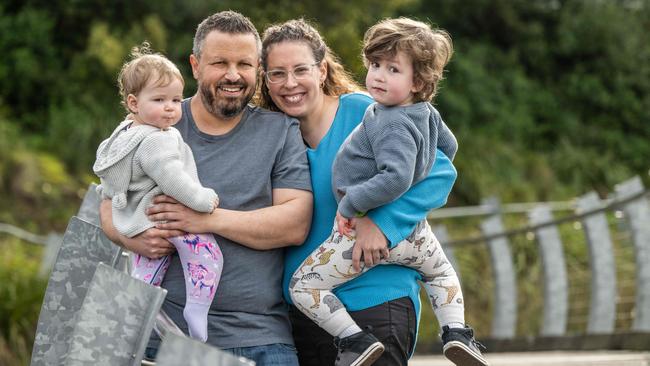
After having to shell out $33,500 for the targeted therapy drugs he is now taking, he is pushing for the medication to be subsidised for other breast cancer patients.
He also wants to encourage men with the disease in their families to get BRCA gene testing.
Mr Hughes wishes he had done so after his mother was diagnosed 10 years ago. But he is thankful that when he and Shauna were conceiving their children, Archie (now three) and Charlie (11 months), they could use Pre-implantation Genetic Testing to select embryos that didn’t have the harmful BRCA2 gene.
Mr Hughes has recently been working behind the scenes on the Field of Women, which will see more than 10,000 people stand on the MCG before this Sunday’s Melbourne-Hawthorn match to bring breast cancer statistics to life.
Participants in blue ponchos will represent the 200-plus men who will be diagnosed with breast cancer this year.
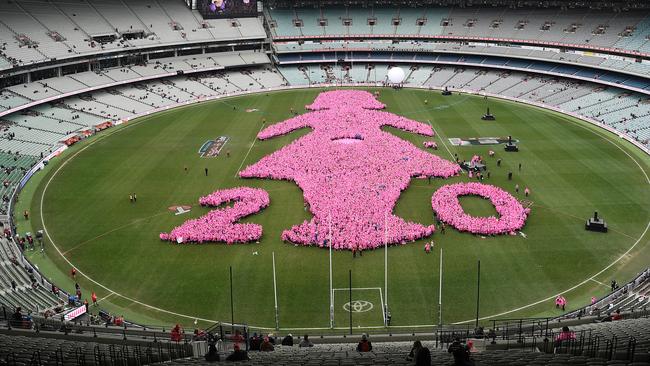
While Mr Hughes will be watching from afar – he and his family jetted off on a bucket-list European holiday this week – he hopes the event will help normalise male breast cancer.
“If we further isolate men, there’s going to be less help seeking,” he said.
Field of Women ticket sales will help BCNA continue providing support, information and advocacy for breast cancer patients. Participants can join others standing on the ’G or you can also buy a virtual place.
Visit fieldofwomen.org.au
Breast cancer survivor’s incredible Ironman comeback
Ironman training and cancer treatment might not seem compatible, but Canberra lawyer Allyson Martin defied expectations by taking on both formidable challenges simultaneously.
During Australia’s first pandemic lockdown in March 2020, while preparing for the Ironman Australia triathlon, then 33-year-old Ms Martin received an aggressive stage two breast cancer diagnosis.
Within a week of her biopsy, Martin underwent a mastectomy and breast reconstruction, she then faced a failed round of IVF, started six weeks of chemotherapy and radiotherapy, began hormone therapy and entered medically induced menopause.
Ms Martin said despite the mental and physical challenges, she was determined to maintain her personal sense of normality by continuing her fulfilling work as a lawyer and training with her triathlon squad for the gruelling 3.8km swim, 180km bike and 42km marathon event.
“I’m pretty pragmatic and don’t usually like to dwell on things I can’t control, so … I really focused on … what I could do to look after myself, both physically and mentally, and one of those things was continuing to train,” she said.
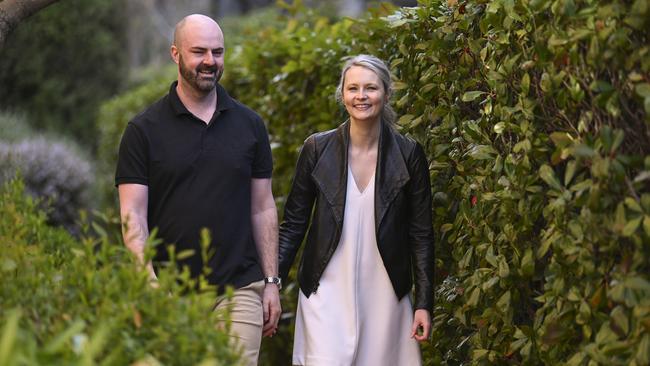
Supported by husband, David Uncle, Martin’s training intensity during Covid lockdowns reduced as chemotherapy took its toll and she stayed out of the pool as she was immunocompromised.
“I would do my run training with my squad, we were allowed to still meet up and do that outside, which was really good and really positive. Obviously ironman races were cancelled, but they had virtual races and I did a few of those.
“So much of cancer treatment is really passive and you’re just along for the ride … so there’s a lot there you don’t really have a lot of control over because you obviously want to survive and that’s just what needs to be done.
“For me, being able to a certain extent be in charge of my own life and do some of those things like training and work, those were two of the really important things I did.”
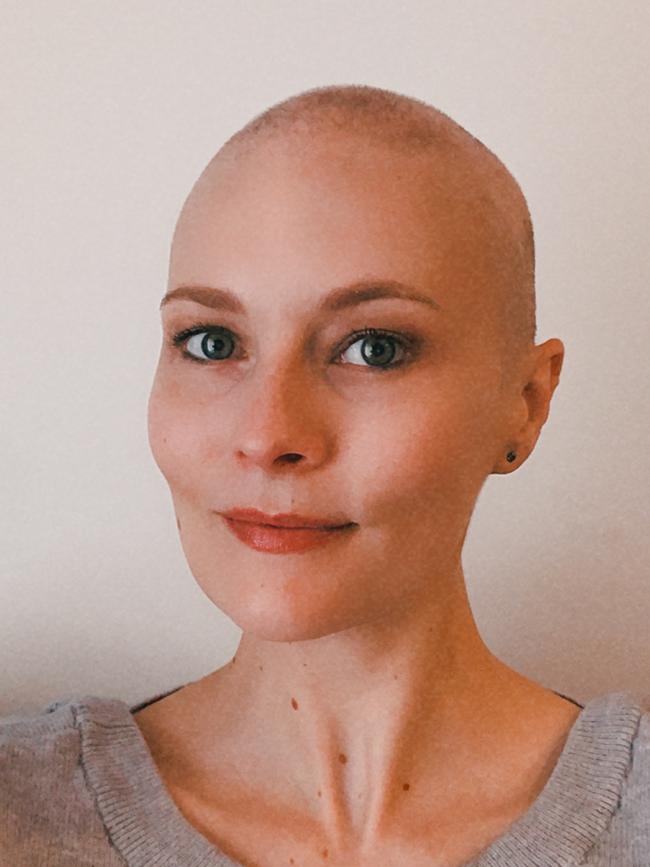
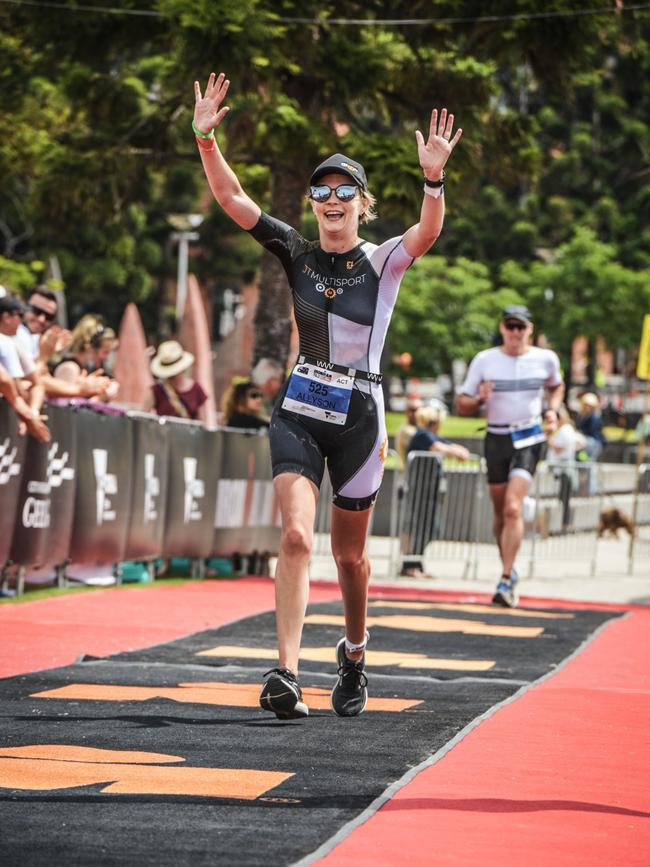
As a young female athlete facing breast cancer, Ms Martin found many resources weren’t tailored to her, so connected with women who could relate through Instagram.
“Breast cancer is the most common type of cancer in women and particularly older women and a lot of support networks are really tailored to older women, where that’s not really necessarily where I’m at in life,” she said.
“Having a younger community is really important because you’re in a different stage of life.
“Breast Cancer Network Australia’s resources were good, they talked a lot about fertility … and the type of treatment that was coming and what that might look like for me.
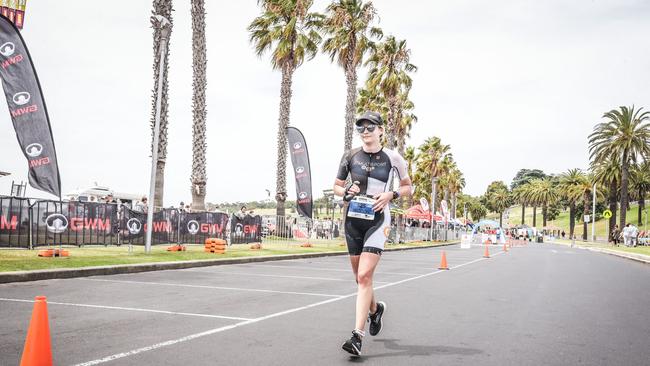
“But the things that were useful for me were how can I keep exercising? What do you do to manage side effects? So I managed to find other people, especially on Instagram, similar to me.”
Ms Martin will be joined by her husband and 10,000 others when she stands on the MCG for the Field of Women before Sunday’s AFL match between Melbourne and Hawthorn.
“It will be really special to stand on the MCG,” she said.
“To be around a community of people who understand your lived experiences and how that can fundamentally change your perspective on life, being there in one spot, seeing what that looks like and how much love and support everybody has around them will be really special.”
More Coverage
Originally published as Breast cancer patients seek solidarity, ‘community’ from Field of Women




